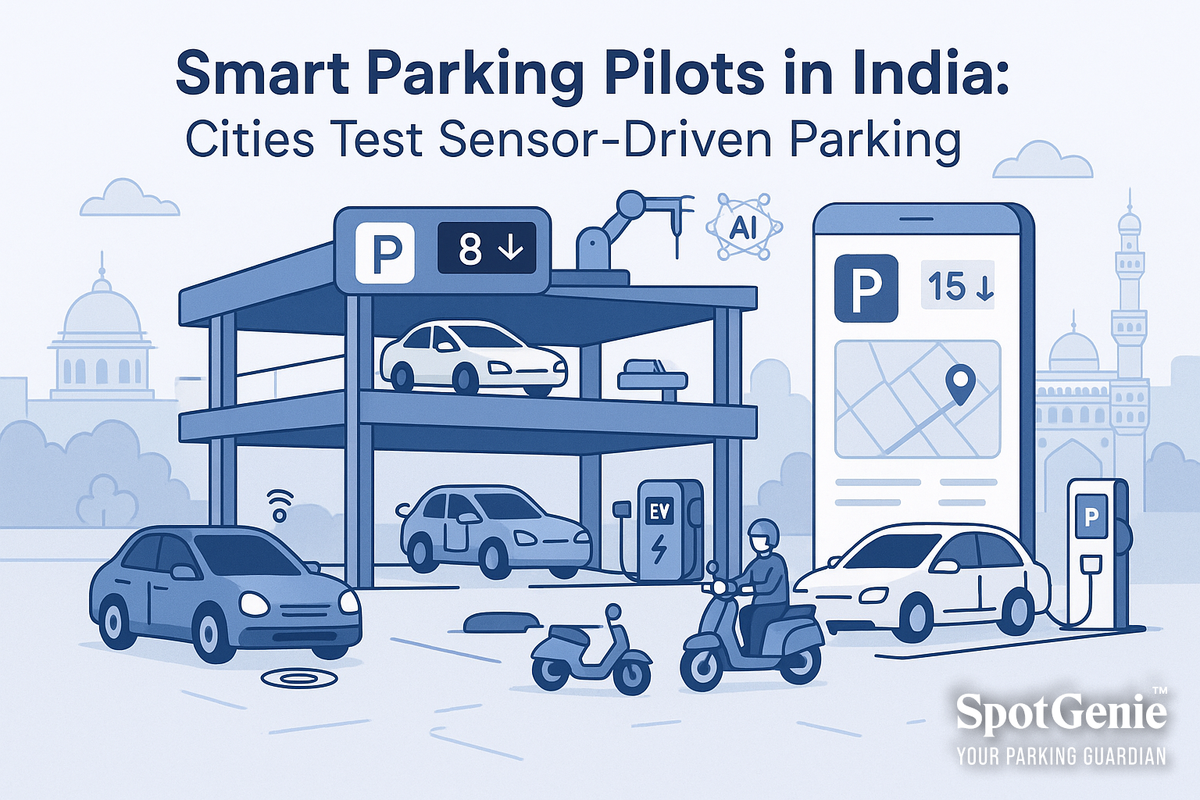Smart Parking Pilot Projects in Indian Cities
Discover how Indian cities are testing sensor-based smart parking—Hyderabad, Chandigarh, Thiruvananthapuram—and the impact on commuters.

Smart Parking Pilots in India: Cities Test Sensor-Driven Parking
SpotGenie Gyaan brings you the most relevant, actionable insights from India’s transport, traffic, and mobility sectors—one post at a time.
Understanding Smart Parking Technology
Smart parking is the integration of IoT-enabled sensors, digital payment solutions, real-time parking data, and dynamic pricing into public and private parking infrastructure. It helps reduce time spent searching for spots, improves urban traffic flow, and brings transparency to revenue collection. These solutions are increasingly being adopted under India’s Smart Cities Mission, which promotes urban technology upgrades across sectors.
Recent Pilot Projects in Indian Cities
- Hyderabad (KBR Park): Rotary multi-level automated parking facility for 72 vehicles launched in Jubilee Hills. Citizens have welcomed the smooth automation and reduced congestion during peak hours.
- Thiruvananthapuram: Multi-level car parking facilities are being tested at hospital and market locations, with combined capacity exceeding 200 vehicles. Automation is expected to cut long waiting times.
- Dehradun: A government-run automated parking system at Coronation Hospital has been launched under the Smart Cities scheme, setting the benchmark for future expansion in Uttarakhand.
Policy Moves & Infrastructure Plans
- Chandigarh: The city is planning an AI-driven smart parking project covering 89 zones, introducing monthly pass systems and dynamic pricing based on demand. The aim is to discourage long-term curbside parking and free up high-traffic areas.
- Mumbai: Four underground parking lots are being constructed along the coastal road corridor in Worli to manage beachside congestion. Two lots are near completion and expected to be operational by Q4 2025.
Benefits, Challenges & Scale-Up Strategy
Benefits: Smart parking reduces time spent searching for spots, improves fuel efficiency, decreases traffic congestion, and increases city revenue through better utilization of space. EV-compatible spots with chargers are also being integrated to support green mobility goals.
Challenges: High installation costs, maintenance of sensors and software systems, uneven adoption by users, and lack of system-wide standardization slow down progress. Integrating public and private parking databases remains a hurdle in cities like Bengaluru and Chennai.
What Drivers & Municipalities Should Do
- Start using available smart parking apps that provide real-time availability and pricing.
- Opt for digital payments and subscribe to monthly passes where available.
- Use designated parking spots instead of curbside options to reduce violations.
- Report non-functional sensors and unauthorized parking using civic platforms.
- Encourage RWAs and private builders to adopt automated parking infrastructure for gated communities.
Conclusion
Smart parking is more than just a tech upgrade—it's a necessity for India's growing urban population. With pilots already underway and public reception improving, cities must work on seamless integration, transparency, and widespread education to truly unlock its potential. Stay tuned for tomorrow’s SpotGenie Gyaan, where we decode another key development shaping your daily commute.
Follow us on:
🅾 Instagram |
ⓕ Facebook |
𝕏 X |
▶️ YouTube |
🟢 WhatsApp



